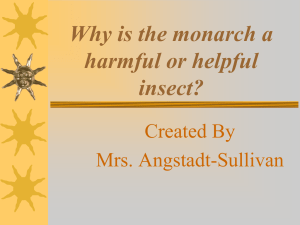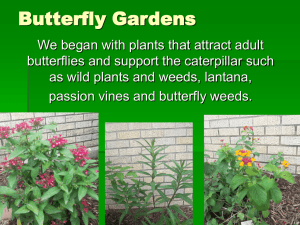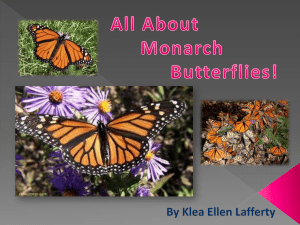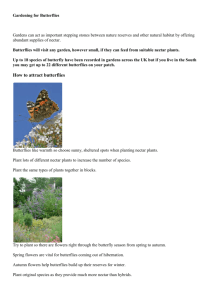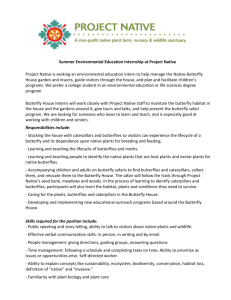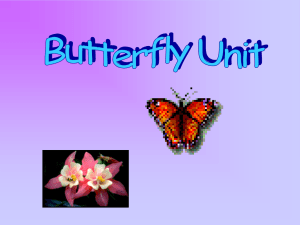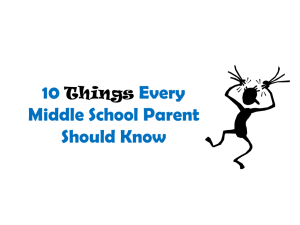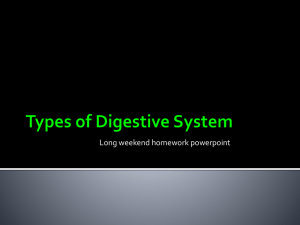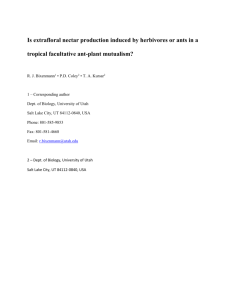N - Door County Master Gardeners
advertisement
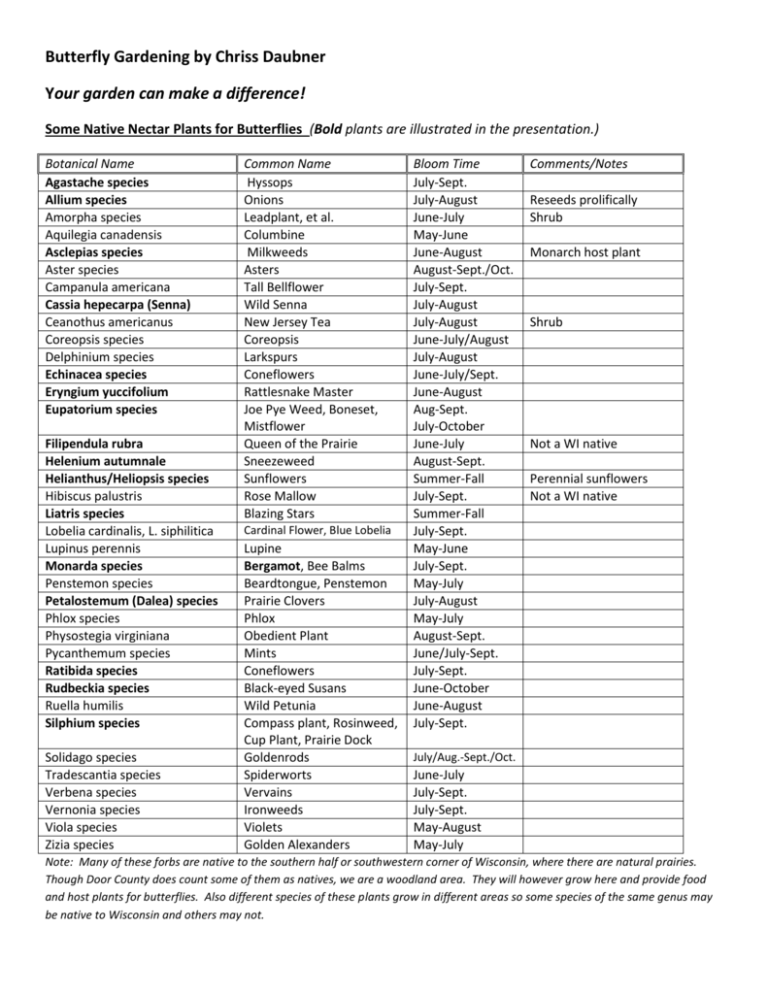
Butterfly Gardening by Chriss Daubner Your garden can make a difference! Some Native Nectar Plants for Butterflies (Bold plants are illustrated in the presentation.) Botanical Name Agastache species Allium species Amorpha species Aquilegia canadensis Asclepias species Aster species Campanula americana Cassia hepecarpa (Senna) Ceanothus americanus Coreopsis species Delphinium species Echinacea species Eryngium yuccifolium Eupatorium species Filipendula rubra Helenium autumnale Helianthus/Heliopsis species Hibiscus palustris Liatris species Lobelia cardinalis, L. siphilitica Lupinus perennis Monarda species Penstemon species Petalostemum (Dalea) species Phlox species Physostegia virginiana Pycanthemum species Ratibida species Rudbeckia species Ruella humilis Silphium species Solidago species Tradescantia species Verbena species Vernonia species Viola species Zizia species Common Name Hyssops Onions Leadplant, et al. Columbine Milkweeds Asters Tall Bellflower Wild Senna New Jersey Tea Coreopsis Larkspurs Coneflowers Rattlesnake Master Joe Pye Weed, Boneset, Mistflower Queen of the Prairie Sneezeweed Sunflowers Rose Mallow Blazing Stars Cardinal Flower, Blue Lobelia Lupine Bergamot, Bee Balms Beardtongue, Penstemon Prairie Clovers Phlox Obedient Plant Mints Coneflowers Black-eyed Susans Wild Petunia Compass plant, Rosinweed, Cup Plant, Prairie Dock Goldenrods Spiderworts Vervains Ironweeds Violets Golden Alexanders Bloom Time July-Sept. July-August June-July May-June June-August August-Sept./Oct. July-Sept. July-August July-August June-July/August July-August June-July/Sept. June-August Aug-Sept. July-October June-July August-Sept. Summer-Fall July-Sept. Summer-Fall July-Sept. May-June July-Sept. May-July July-August May-July August-Sept. June/July-Sept. July-Sept. June-October June-August July-Sept. Comments/Notes Reseeds prolifically Shrub Monarch host plant Shrub Not a WI native Perennial sunflowers Not a WI native July/Aug.-Sept./Oct. June-July July-Sept. July-Sept. May-August May-July Note: Many of these forbs are native to the southern half or southwestern corner of Wisconsin, where there are natural prairies. Though Door County does count some of them as natives, we are a woodland area. They will however grow here and provide food and host plants for butterflies. Also different species of these plants grow in different areas so some species of the same genus may be native to Wisconsin and others may not. More Native and Non-native Nectar Plants for Butterflies * Plant is also a host plant # Top Nectar Plant Achillea (Yarrow)* Impatiens Ageratum (Floss Flower) Lantana Alcea (Hollyhock) Lavender * Anaphalis margaritacea (Pearly Everlasting)* Liatris (Blazingstar) # (especially Liatris ligulistylis for Monarch) Antirrhinum (Snapdragon) Arabis (Rock Cress) Lobelia Asclepias (milkweeds)* Lobularia (Sweet Alyssum) curassavica-Mexican milkweed Lupinus (Lupine) * incarnata-swamp milkweed Marigold * syriaca-common milkweed Mentha (Mint) tuberosa-butterfly weed # Monarda (Bergamot, Bee Balm) Asters (especially native asters) #* Baptisia (False Indigo) Buddleia (Butterfly Bush) # Chrysanthemum (Daisy) Cirsium (Thistle) Use native thistles!* Nasturtium * Pentas Phlox * Physotegia (Obedient Plant) Rudbeckia (Black-eyed Susan) # Coreopsis (Tickseed) # (especially Rudbeckia hirta) Cosmos Sage Dianthus Salvia Echinacea (Coneflower) # Solidago (Goldenrod) Eupatorium (Boneset, Joe-Pye Weed) # Tithonia (Mexican sunflower) # Helenium (Sneezeweed) Verbena Helianthus (Sunflower) # Vernonia (Ironweed) Heliotrope Viola (Violet, Pansy) * Hemerocallis (Daylily) Zinnia Common Butterflies, their habitats, host plants and adult foods Butterfly Habitat Larval Food Adult Food Monarch Open fields, roadsides Milkweeds Nectar Swallowtail, Black Open areas Fennel, parsley, dill, Queen Anne lace Nectar-tall flowers, puddling Swallowtail, Tiger Moist wooded areas Aspen, Black cherry Nectar-tall flowers, puddling Red Admiral Moist woods edges False nettle, nettles Nectar, sap, fruit, dung Painted Lady All open areas Thistle Nectar American Painted Lady Moist open areas Everlasting, pussytoes Nectar, puddling Fritillary-Meadow & Variegated Open, moist areas Violets Nectar, dung Fritillary- Open areas Violets Nectar Milbert’s Tortoiseshell Open areas near streams Nettles Nectar, some sap and fruit Mourning Cloak Open areas Aspen, birch, elm, hackberry, willow Sap, fruit, puddling Comma Forested Areas Hops, nettles, elms Sap, carrion, fruit, dung Question Mark Open areas near forests Elms, hackberry, hops, nettles Sap, carrion, fruit, dung, puddling Spring Azure Fields, forests Dog wood, wild cherry, meadowsweet Nectar, puddling Pearl Crescent Open areas Asters Nectar, puddling Northern Crescent Open areas Asters Nectar White Admiral Birch, aspen forests Birches, aspens Nectar, carrion, fruit, dung, sap Red-Spotted Purple Moist forests, willows Aspen, wild cherry, poplars Nectar, carrion, fruit sap, dung Viceroy Moist shrubby areas Willow, aspens Nectar, sap, dung, puddling Common Wood nymph Open grassy areas, woods edges Grasses Plant juices, some nectar Little Wood satyr Grassy woodlands Grasses Sap, rarely nectar Great-spangled Chart information mainly from: Stokes Butterfly Book by Donald & Lillian Stokes & Ernest Williams http://www.StokesBooks.com Resources for Butterfly Gardening Books Attracting Butterflies to Your Garden, by editors of Rodale Gardening Books; Rodale Press, Inc. Bringing Nature Home by Douglas W. Tallamy; Timber Press Butterfly Book by Donald & Lillian Stokes & Ernest Williams; Little, Brown and Company Butterfly Gardening by Thomas C. Emmel, Ph. D.; Friedman/Fairfax Publishers Butterfly Gardens by Alcinda Lewis and Steve Buchanan; Brooklyn Botanic Garden Inc. Creating a Butterfly Garden by Marcus Schneck; Simon& Schuster Inc. Familiar Butterflies of North America National Audubon Society Pocket Guide; Alfred A. Knopf How to Raise a Monarch Butterfly by Mary L. Thorne; Caterpillar Publishing Invasive Plants of the Upper Midwest by Elizabeth J. Czarapata; University of Wisconsin Press Landscaping with Native Plants of Wisconsin by Lynn M. Steiner; Voyageur Press Natural Gardening, A Nature Company Guide published by Time-Life Books North America’s Favorite Butterflies by Patti and Milt Putnam; Willow Creek Press Secret Lives of Backyard Bugs by Judy Burris and Wayne Richards: Storey Publishing The Butterfly Garden by Mathew Tekulsky; The Harvard Common Press The Family Butterfly Book by Rick Mikula; Storey Publishing The Life Cycles of Butterflies by Judy Burris & Wayne Richards; Storey Publishing The Wildflower Book East of the Rockies by Donald and Lillian Stokes; Little, Brown and Company 100 Easy-to-Grow Native Plants by Lorraine Johnson; Firefly Books Websites Southern Wisconsin Butterfly Association (NABA) www.naba.org/chapters/nabawba The Xerces Society www.xerces.org The Monarch Watch www.MonarchWatch.org Wisconsin Butterflies www.wisconsinbutterflies.org Butterflies and Moths of North America www.butterfliesandmoths.org “Nature—wild nature—dwells in gardens just as she dwells in the tangled woods, in the deeps of the sea, and on the heights of the mountains; and the wilder the garden, the more you will see of her there.” Adventures in Green Places, Herbert Ravenel Sass (1884-1958), American nature writer

